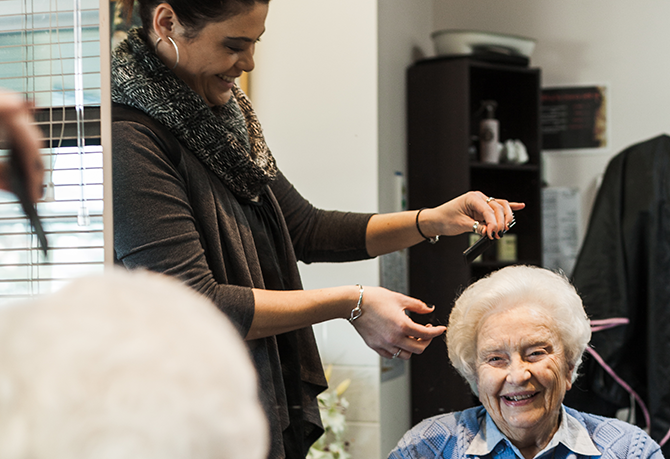Care Redesign
Our program of Care Redesign is built on the need to provide high quality care that improves the lives of people with dementia. We have established partnerships which can lead change and focus on the need to optimise care at end of life, provide the best care for daily living, address comorbidities of dementia and provide a better understanding of ways to reduce inappropriate or preventable hospital admissions.
Clinical Redesign: Collaborative Decision Making
Key elements of evidence based palliative care for people with dementia in Residential Aged Care Facilities (RACFs) include effective leadership and management of care, excellence in clinical expertise, timely and appropriate education, and decision making which is shared with family members. This study will build capacity for palliative care planning, informed by family members, through collaborative decision making/care conferencing. The specific aims of the project are:
- To improve knowledge of dementia palliative care among family members of people with moderate to advanced dementia and aged care staff in RACFs, with targeted education programs;
- To create partnerships between RACF staff and family carers, resulting in authentic shared decision making based on improved communication;
- To build an inter-sectorial Community of Practice (CoP) that brings together the expertise and resources of dementia specialist acute/community providers, to enhance decision making in RACFs.

Oral Health
In Australia, 19.2% of older adults hospitalised for acquired pneumonia die, and the annual direct and indirect cost burden is estimated to be more than $500 million. International studies report that systematic oral care can achieve up to a 70% reduction in aspiration pneumonia and pneumonia-related transfers to hospital for residents with dementia. The Wicking Centre's recent studies have documented the barriers, real and perceived, that prevent the implementation of systematic oral care for adults with dementia in RACFs. These findings confirm our significant body of research showing that sustainable clinical innovations need the ongoing support of strong, engaged leadership and consumer involvement as well as appropriately educated staff.
Goldberg, L.R., Crocombe, L.A., Heiss, C.J., Lea, E.J., & Price, A. (2016 – under review). Real and perceived barriers to oral care for residents with dementia. Journal of Advanced Nursing.
Crocombe, L.A., Goldberg, L.R., et al. (2016 – under review). A comparative analysis of policies addressing rural oral health in eight OECD countries. Journal of Rural and Remote Health.
Nutrition
Malnutrition affects almost 1 out of every 4 older people and is particularly prevalent among older people with dementia. Well-balanced and consistent nutrition is vital for older people's quality of life, positive health outcomes, maintenance of independence and, in the hospital setting, reduced length of stay, fewer post-operative complications and lower likelihood of readmission. Yet, studies have shown that around two-thirds of people with dementia are malnourished or at risk for malnutrition. We are interested in exploring how changes can be made to care practices in residential aged care and acute care settings to better meet the nutrition and hydration needs of people with dementia. The Wicking Centre's work has identified important barriers to provision of person-centred care in aged care facilities. These include care staff, despite being attentive, using ineffective strategies to prompt eating; food being presented in a manner that restricts resident choice; lack of monitoring of body mass index; and staff lacking a 'big picture' view of the relationship of adequate nutrition and hydration to key clinical indicators of function and health.
Lea, E.J., Goldberg, L.R., Price, A.D., Tierney, L.T. & McInerney, F. (2019). Best intentions or best practice? A case study of the nutritional needs and outcomes of a person with dementia living in a residential aged care home. International Journal of Nursing Practice, 25(1), e12692. doi: 10.1111/ijn.12692.
Respiratory Care
Respiratory conditions such as Chronic Obstructive Pulmonary Disease (COPD) are a significant comorbidity for people with dementia in residential aged care facilities (RACFs). The severity of such conditions is often underestimated and, consequently their management is often inadequate. Poor respiratory health impinges on mobility, socialisation, and nutrition and can result in anxiety and respiratory distress, all of which can have a significant impact on quality of life. Acute exacerbation can lead to unplanned hospital admission with COPD being identified as one of the five main conditions responsible for potentially avoidable hospital admission in aged care residents.
Our work suggests that an education program for care staff in identifying, assessing, responding to and supporting management of respiratory conditions in residents with dementia will result in increased knowledge to support improved respiratory care for people with dementia in aged care facilities.
General Practice in Aged Care
Ageing of the Australian population means that people now being admitted to residential aged care facilities (RACFs) are older, have higher care needs and often have dementia. In collaboration with BUPA, this project is examining the efficacy of employing skilled GPs in RACFs, in terms of patient outcomes and the effectiveness of health care resource utilisation. The evaluation will involve implementing a randomised controlled trial. The primary outcomes being evaluated will include unnecessary hospital transfers, falls and poly-pharmacy. A range of secondary outcomes will also be evaluated. The findings will establish the benefits associated with employing GPs in RACFs and will have potential applicability across the sector to improve quality outcomes for residents.